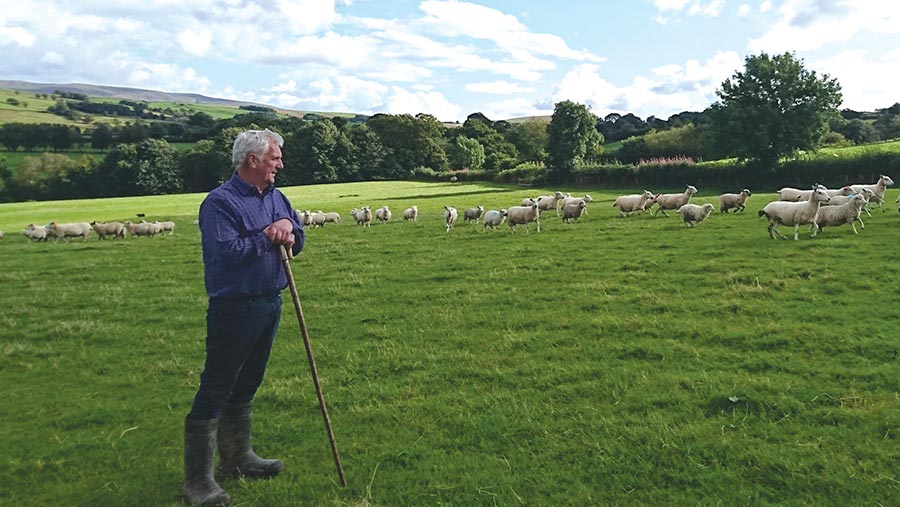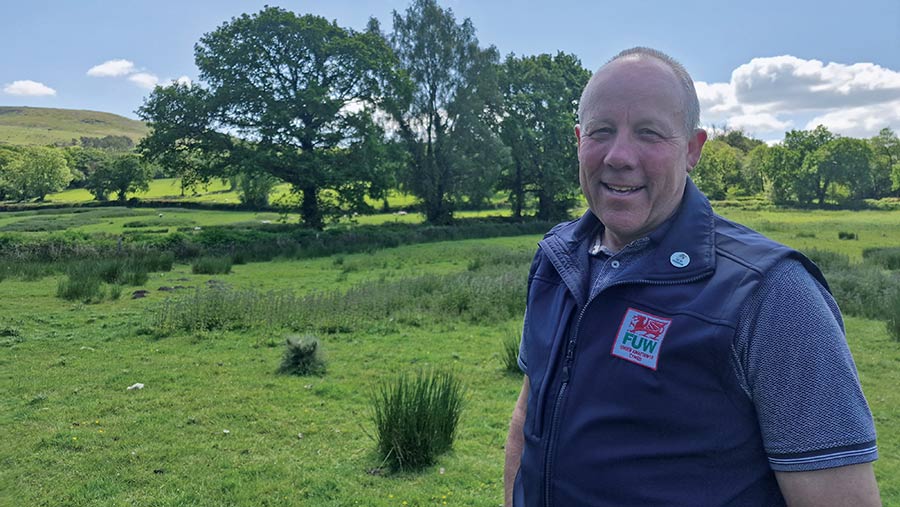Departing Farmers’ Union of Wales chief reflects on tenure
 © Debbie James
© Debbie James Brexit, a pandemic and rampant ag-inflation – three unexpected and high-impact events – have dominated the eight years Glyn Roberts has been at the helm of the Farmers’ Union of Wales (FUW).
As he steps down from office, to give way to new president, Ian Rickman, Mr Roberts catches up with Farmers Weekly about his time at the FUW in this Q&A.
See also: New Welsh farm support scheme majors on tree planting
What has been your proudest achievement as FUW president?
The highlight has been Wales’ first agriculture bill being agreed by the Senedd, being part of history in the making, and getting the framework in place for future farming policy.
We have got it to a much better position than the one the Welsh government originally proposed.
In 2017, the very first consultation on post-CAP support, “Brexit and our Land”, was published and it was essentially a glorified Glastir scheme.
Everything was based on the environment – it didn’t take into account the production of food, people living in the countryside, the rural economy.
I was proud to share a platform with John Davies, at that time president of NFU Cymru, in addressing the Senedd and putting our case for why we felt this was wrong.
We did everything we could to convince the government to change their original proposals.
In what we now have in the Sustainable Farming Scheme there is indeed a big shift in policy that takes those things into account.
What has been the most frustrating element of the job?
Politics is the art of the possible.
You can’t get everything you want, you have to accept compromise and get to a position where you are reasonably happy with the outcome.
Is Welsh farming in a better place today than it was eight years ago?
Unfortunately, the industry isn’t in such a healthy situation for several reasons.
As someone who wanted the UK to stay in Europe, Brexit is one element of that.
The war in Ukraine has also made it difficult in terms of the cost of inputs, and Covid had a devastating effect on many of our members.
Unfortunately, a number of our farming friends were lost to Covid.
But there is a paradox. Covid changed how the general public perceive farming because of the food shortages it created.
Our challenge now is to keep the relevance of local food in the minds of consumers.
If you could change just one thing about Welsh government farming policy, what would it be?
I would like to see it consulting us as an industry before making decisions such as expanding the nitrate vulnerable zone from covering 2.4% of Wales to the entire country.
This was done without enough discussion with farmers, the unions, the industry.
It is all very well bringing in rules and regulations, but these have to be implemented on the ground by farmers, so every scheme should be empirical, and agreed in consultation with the industry.
What’s next for you?
I am lucky enough that my daughter, Beca, is a partner in our farming business.
She kept it going while I was away on FUW business and I couldn’t have done it without her.
We have about 1,000 sheep and 65 suckler cows – I will now have more time to help with the work involved with those.
But I am also lucky in that I have several interests. I enjoy sheepdog trials and also reading – especially poetry, history and autobiographies.
A common theme in a lot of the autobiographies I read is the commitment the authors make for the betterment of society without needing any glory for that.
I feel that this should also be true of the role of a union president. It has pushed me forward to do what I have done.
New officeholder team for FUW
Glyn Roberts has recently been succeeded as FUW president by second-generation Carmarthenshire sheep and beef farmer Ian Rickman, who was elected to the post.

Ian Rickman © Farmers’ Union of Wales
Other new officeholders include:
- Pembrokeshire dairy farmer Dai Miles (deputy president)
- North Wales beef and sheep farmer Alun Owen (North Wales vice-president)
- Glamorgan beef and sheep farmer Brian Bowen (South Wales vice-president)
- Ceredigion sheep farmer Anwen Hughes (mid-Wales vice-president).
